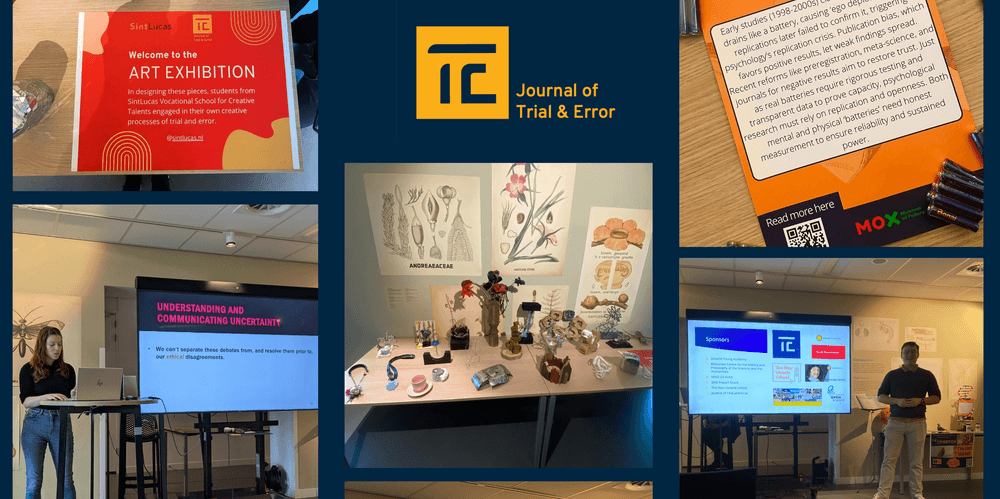~ 8 min read
JOTE in Conversation: Léa Roumazeilles. How Does Failure Arise and How Do You Deal With It?
ByMax Bautista PerpinyaOrcID & Lea RoumazeillesOrcID
We are glad to publish this first interview as a set of conversations that we’ve been having with researchers from several fields and universities. These interviews revolve around how researchers experience 'failure' and 'success' within their research practices - whereby 'practices' can range from the research proposal and funding to experimental constraints and publication. How does failure arise in these aspects? And how do researchers in different fields and career stages deal with failure? These are the questions that guide our conversations.
For our first interview, we talked with Léa Roumazeilles, PhD candidate in Neurobiology at Oxford University. We spoke with her about the challenges and successes in researching her thesis subject: ‘Structure and function of the social brain in primates’.
What is your background?
I did a double undergraduate in Paris. I studied Biology at the Université Pierre Marie-Curie and History at La Sorbonne. For my Master’s I moved to the Université de Strasbourg where I studied at the Joint Master in Neuroscience.
And from there, how did you get where you are now?
My way into the PhD was through my research assistantship at the lab that I am at now. I was there for one year, and then I applied to several PhD research programmes within Oxford. I went through the interviews and was admitted to this laboratory. I have been doing my PhD now for almost 3 years.
Is it a paid position?
I have the University’s PhD fees paid by the Biotechnology and Biological Sciences Research Council (BBSRC). Regarding my personal funding, I did not get the full scholarship, but my supervisor was happy to pay with the laboratory money for the rest of my salary. The New College (founded in the 14th century) that I am part of here in Oxford also subsidises my salary.
What kind of research do you do?
The name of the project is ‘Structure and function of the social brain in primates’, so I am looking at a variety of primate brains and trying to understand how the differences in function and connectivity can explain differences in social abilities. I am studying what is called the ‘social brain network’.
Tell us a bit about your work with the animals: what is it like?
I study the functional side of the project with monkeys. I use the brain imaging tool fMRI (functional magnetic resonance imaging), which allows me to see the function of different brain regions while the monkeys perform tasks on a computer. These tasks resemble those that we do with human subjects. Basically, I am able to see what these regions do for each task. So fMRI is part of the functionality studies. For the anatomical research I use post-mortem brain samples of primates, and with those, I trace the connections between the regions.
You also handle animals, right? How do you get trained to work with the monkeys?
Here in Oxford, I had to take a course with a final exam, and that allowed me to be with the animals. But after passing the exam you still need to be trained and supervised. It took about 4 months of training as a research assistant to be able to be on my own with the monkeys.
Where does your research stand - is it applied or fundamental? Or is it perhaps neither?
I think it’s more basic science. My project is fitted within a larger evolutionary project, so in that way, my project aims to explore how our brains work and where they come from evolutionarily speaking.
Since I am working with monkeys, and because of our research question, I’d say that the application of what we find is quite far down the line. The closest to applications that I could think of would be in the field of autism research. Some of our models are similar to those models of autism.
Your research is not medically oriented, then?
No, not really. I am funded by the Biotechnology and Biological Sciences Research Council, which supports fundamental science. If I would do more applied medical research I would have to be funded by another council. They [the Research Councils] are very specific about what you can investigate given the funding that you have. In my case, that frames my research outside medicine, and within fundamental research.
Have you published some of your work already?
My name is on a couple of papers because I helped in some of the projects I was involved in. But I still haven’t published any major work. I am excited because I have just submitted my first author paper though!
On the topic of success, and failure - has something gone wrong during your experiments? How did you deal with it?
Well, actually, these past weeks it's been difficult because of that. I've been training the monkeys on a task for a bit more than a year. That's every morning for four hours, and this week I realised that they just won't learn this task. So I need to change the task. [laughs] Which is quite... Well, annoying.
The thing is, we designed this task to be very similar to a human task, and the monkey just don't get it. The behaviour that the monkeys have to do seems very easy for us, but they just won't learn it. And we were really not expecting that, so now we have to find ways of finding new ways of answering the same question.
You trained your monkeys for a year in this task. Is that normally how long it takes for them to learn a behaviour?
It depends a bit. My monkeys had learnt a very easy task just before. So it depends how long they've been trained beforehand, and the nature of the task. You can sometimes expect them to learn in six months.
What was this task exactly?
It was very simple. There were two objects on each side of a computer screen, and the monkey had two sensors (two buttons), one for each side of the screen. The two objects were the same, but only one had a reward - so you couldn't know which one was the one with the prize. At some point, there would be a 'cue' in the middle of the screen. In our case, it was the face of a monkey that would turn left or right and would give you good advice or bad advice on where the reward was. The idea was that the test monkeys would eventually learn which of the cue monkeys was giving bad advice or good advice.
This had not been done before, and we thought that it would work. It is known that monkeys can recognise facial expressions in other monkeys. But in our case, I think that they just can't infer that there are two types of advice. They couldn’t tell which one was giving good or bad advice.
And how did the monkeys realise that it didn't work?
Because they weren't following the advice at all. Normally they want to maximize the rewards, they are quite greedy... [laughs]. And these monkeys just couldn't.
What are you going to do now that the experiments didn't show what you expected?
Yes... [laughs and then silence] That's a good question. Since they can't learn the task, we have to change it completely. But the new experiments still have to fit within my PhD project and have to be close to the questions that we were asking before. Our project was part of a collaboration with another group doing the same tasks with humans, and so it would be good to keep collaborating and having comparable links with them. If we have the same or very similar tasks between our monkeys and their humans, we can then study the relationship between them.
Are you going to publish what you’ve found in the past year somehow?
Well, there isn't much that we could do with it. I don't have much data, just some behavioural data. I kept trying to change the task a little bit each time, trying to see if they would learn. So that means that I don't have enough data of one single task to report. I don't think that I have very usable data at the moment.
Also, I don't really know why they don't learn, and that is a big question that we should be answering. It could also be a lot of external factors, like changing the rooms of the tests, if they had surgery, etc.
It is true that it would be good to get this out there so that if someone else tries these tasks, they would know about it.
If you would know why it didn't work, would you go ahead and try to publish it?
If I wouldn't be constrained with time, I would consider it. The thing is, I need to be done with data collection in March, and I haven't really been able to get good data yet. My initial idea was that I would record their brain activity while they were doing the task, but since they couldn't learn the task, I have no measure of brain activity. And getting everything running will take time, so I also don't really have time to write a report on what has happened so far.
I see, writing a report does take time. Well, thank you for your time and good luck to you finding an experiment that does work!
Thank you!






